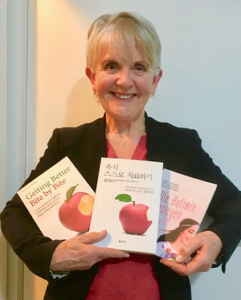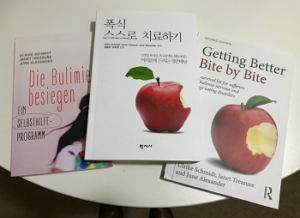Getting Better Bite by Bite – in English, German and now Korean
Getting Better Bite by Bite – in English, German and now Korean

Meeting the need for universal eating disorder recovery guidance
by June Alexander
My granddaughters, aged eight and six, excitedly helped to unwrap a book that arrived this week. I was already excited, because I could see the book was from Seoul, Korea.
The sender, Professor Youl-Ri Kim, has translated the Getting Better Bite by Bite, a recovery guide for sufferers of bulimia nervosa and binge eating disorders, into Korean. Professor Kim had kindly sent a copy. My granddaughters, my little helpers and inspirers, took turns to take the pictures shared with you today.
People may speak different languages but the language of an eating disorder is universal, and translation of evidence-based information into different languages is therefore vital. Everybody needs and deserves access to the knowledge, hence my excitement with announcement of this Korean publication.
The important truth throughout Getting Better Bite by Bite is that recovery is possible — at every age. This book does not pretend that recovery from an eating disorder is easy. As explained in the introduction, what this book does do is arm you with skills and knowledge to make your recovery journey as smooth and rewarding as possible.
Facing the truth: there’s nothing glamorous about an eating disorder
Getting Better Bite by Bite portrays what life is really like, living with bulimia nervosa or binge eating disorder. Until directly affected by an eating disorder, most people’s perception of these illnesses is obtained from the media. The perception is almost always nothing like reality.
There is nothing glamorous or desirable about bulimia or binge eating. Much mystique remains. Misconceptions and misinformation abound about the causes, the health risks and the treatment. Access to treatment is difficult for many sufferers, and friends and relatives often have no idea how to help.
Also, some doctors are not sympathetic or understanding, and make you feel your problem is self-inflicted and trivial and thereby compound the illness characteristics of guilt, shame and loneliness.
The backstory
This book was originally written by Professors Ulrike Schmidt and Janet Treasure for the patients with bulimia attending the Eating Disorders Clinic at the Maudsley Hospital, London. Their patients wanted information about their illness and practical advice on how to overcome their problems. Getting Better Bite by Bite contains in condensed form the essential ingredients of cognitive-behavioral therapy (CBT), a form of therapy endorsed by the UK’s National Institute of Health and Care Excellence as the most effective treatment for bulimia. In addition, it incorporates evidence-based strategies for successfully changing problem behaviors.
Getting Better Bite by Bite strongly focuses on enhancing the readers’ motivation and belief in their ability to change, includes strategies for dealing with common accompanying problems, and has an easy-to-read conversational style.
The second edition of Getting Better Bite by Bite, in which I became a co-author, was published in 2015 to update the first edition released in 1993. The book has helped many eating disorder sufferers, not only at the Maudsley but, as the German and now Korean versions illustrate, around the world.
Feeling empowered to tackle food problems and other problems in life
Many people, on reading this book, have felt empowered to tackle their eating problem and, beyond that, to address other difficulties in their lives, too. Some people – often those feeling less sure about what they want – have found the book helpful in understanding their problem and gaining tools to make an informed decision about whether or not to enter treatment.
Clinical trials using this book have shown that a significant proportion of people working through this book by themselves make a full and lasting recovery from their eating disorder, and when this book is used with a few sessions of support and guidance from a therapist, it is as effective and more sustainable than a much longer face-to-face CBT treatment.
CBT delivered by a therapist typically includes a case formulation in the form of a diagram or map showing how a person’s difficulties all “hang together.” This can be very helpful, especially if it is really tailored to an individual. However, this approach does not always “hit the spot” for the person if, for example, the map is too complicated or too simple, or makes the person feel forced into an unhelpful structure.
This book takes another approach, problem-led, with each chapter tackling an area relevant to most or particular subgroups of people with bulimia or binge eating.
Remember, there is always a solution
Above all, the book is written to help you on your journey to recovery.
You must undertake this journey of change yourself, but the book can be your support crew, ready to help you plan and prepare as you travel towards your destination. It provides maps and points out the dangers and pitfalls along the route. Importantly, it can help you find a way to overcome the inevitable obstacles. No matter how big the obstacle, a way can be found around it to achieve recovery. Remember, there is always a solution.
You may have mixed feelings about leaving the sense of security that accompanies the familiar territory of bulimia or binge eating. You know that there are severe dangers on all sides, and you may have constructed ways of ignoring or suppressing those dangers.
You will feel frightened about entering the new territory without the backup of your bulimia or binge eating behaviors. This book is filled with the travelers’ tales of people like yourself who have made the journey before you. They are here to travel with you, to keep you company and help to decrease your sense of isolation.
Clues on how to avoid traps of self-defeating thoughts
Getting Better Bite by Bite is full of clues on how to avoid the traps of self-defeating thought patterns. It contains the tools you need to travel safely along the road to recovery. It shines a light on changes that you can make to replace the short-lived and doomed-to-fail rewards that you get from your illness. It offers safe, reliable, long-lasting alternatives.
Getting Better Bite by Bite also will help you to anticipate, and prepare for, obstacles and detours on the way. You may experience initial discomfort (just like we get aches when we start a new exercise or dance routine, as latent muscle groups are brought into use), but persevere because eventually you will get past this stage and start to recognize and enjoy the many benefits of your new skills and new-found strengths.
If at first you do not succeed, try again, and again
Not everyone is successful at first. Setbacks and lapses commonly occur. However, always remain hopeful because you can learn from these experiences. For some sufferers, the change process is slow and laborious, requiring many attempts before achieving freedom of self; others find the way is easier.
The time taken to recover from bulimia or binge eating disorder is three months on average, but differs for each person. Vigilance and a high level of self-awareness is often necessary for years afterwards to ensure your life remains unshackled by the eating disorder.
You may feel, “I can’t help myself. I have tried. My problem is too severe for this. I need someone else to take over.” However, any form of treatment can work only when you are actively involved. The more you put in, the more you will strengthen and empower your true sense of self. So you might as well start now.
A quick read of Getting Better Bite by Bite will not make you suddenly “snap out” of your problem. However, deciding to do what it takes to stop your chaotic eating pattern is the important first step.
A few words of caution
Some people are persuaded by their families or partners to work on their problems.
This book can help only if you really want to get better for yourself. Getting Better Bite by Bite can’t help if you are not ready to change, or if you just want to change to please somebody else. Chapter One helps you to decide if you are ready to reclaim your freedom. Even when you are determined to get better, there are bound to be ups and downs. The best way to cope is to take each day as it comes and focus on living in the moment, rather than the past.
You may feel tempted to “binge” on this book, that is, read it quickly and throw it in a corner, telling yourself, “this is nothing new;” “I knew all this, already.”
This is certainly what the eating disorder bully wants you to do. Strive to be honest with, and listen to, your healthy self. Take time to absorb and digest each chapter slowly.
What this book can and can’t do
Getting Better Bite by Bite can’t cure you but can help you acquire new coping skills, so that the eating disorder no longer rules your life. This book is not aimed primarily at helping you to understand why you developed an eating problem.
Understanding the underlying causes is often difficult and happens only gradually, if at all. To know what caused the eating problem is important, but rarely helps to change distressing eating symptoms. Getting Better Bite by Bite aims to help you develop new skills to ease these symptoms and to help you gain control over your life. Once eating symptoms are addressed, underlying causes often become clearer and you will more easily see if further professional treatment is required.

Resources
English:
Getting Better Bite by Bite: A Survival Kit for Sufferers of Bulimia Nervosa and Binge Eating Disorders, U Schmidt, J Treasure, J Alexander (2015) Routledge.
German:
Die Bulimie besiegen: Ein Selbsthilfe-Programm
https://www.amazon.co.uk/Die-Bulimie-besiegen-Ein-Selbsthilfe-Programm/dp/3407864094
Korean:
The link to purchase this version of Getting Better Bite by Bite is available here.





